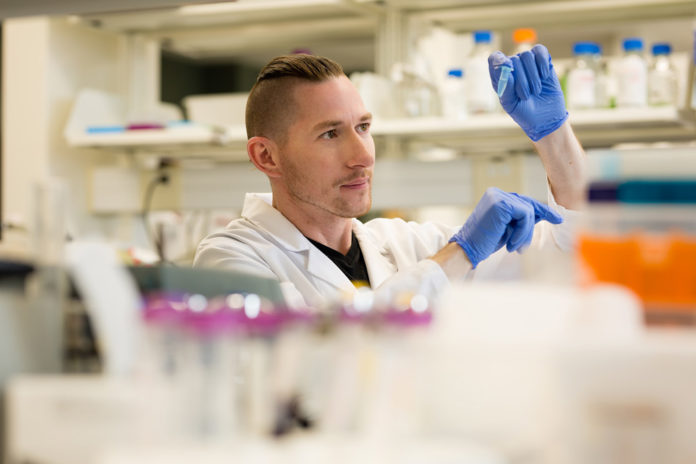A simple test could improve the treatment odds of patients diagnosed with breast cancer, thanks to new research at The University of Winnipeg.
The drug Tamoxifen, used to treat the majority of breast cancer cases, is ineffective in approximately half of all patients who receive it. Dean Reddick, a graduate student in the Master of Science in Bioscience, Technology and Public Policy, is researching a way to identify these patients before treatment starts — saving valuable time in the process.
“You have a patient who has cancer, they’re taking the drug, and both the patient and the physician are thinking the treatment is working. Meanwhile, it’s not working at all and the cancer’s growing very rapidly, and nobody knows that,” said Reddick, who won UWinnipeg’s Three Minute Thesis competition in April.
The research impacts the treatment of estrogen receptor positive (ER+) breast cancer, which accounts for approximately 70 per cent of all breast cancer cases, and is characterized by estrogen binding to an abnormal number of receptors. Doctors typically prescribe Tamoxifen at the start of any ER+ treatment, thanks to its success rate in patients who are responsive to it.
“Tamoxifen is a fantastic drug that delivers targeted therapy to ER+ breast cancer, however not all ER+ breast cancer patients respond to it,” said UWinnipeg biology professor Dr. Anuraag Shrivastav, whose lab has been studying the topic for several years.
Key to solving the issue is a protein within cancer cells known as N-Myristoyltransferase (NMT), which the lab has already discovered activates with increased estrogen receptor activity. Since last September, Reddick has produced 14 different variants of breast cancer cells, each with different localizations of the protein. The plan is now to treat each one and monitor their responses.
“We want to see if these different places where [NMT] is found can actually be acting as a predictive biomarker,” said Reddick. “For instance, if you find all this protein inside the nucleus, are those cells going to be resistant to Tamoxifen or responsive to it?”
Although the lab still has further testing to do, Reddick believes the protein is an indicator of responsive cells.
“We think that [NMT] may be influencing genes that are related to cancer development and actually stopping them from being read and turned into protein. If that’s the case, then that’s going to be good for the patient, because that’s going to slow down cancer growth, period. It could also be slowing down genes that are related to the development of the resistance.”
Once the indicators are identified, Reddick says within three to four years a biopsy could be used to determine a patient’s resistance level and prescribe appropriate treatment.
“Chemotherapy is never ideal, but it is better than a drug that has no effect.”




